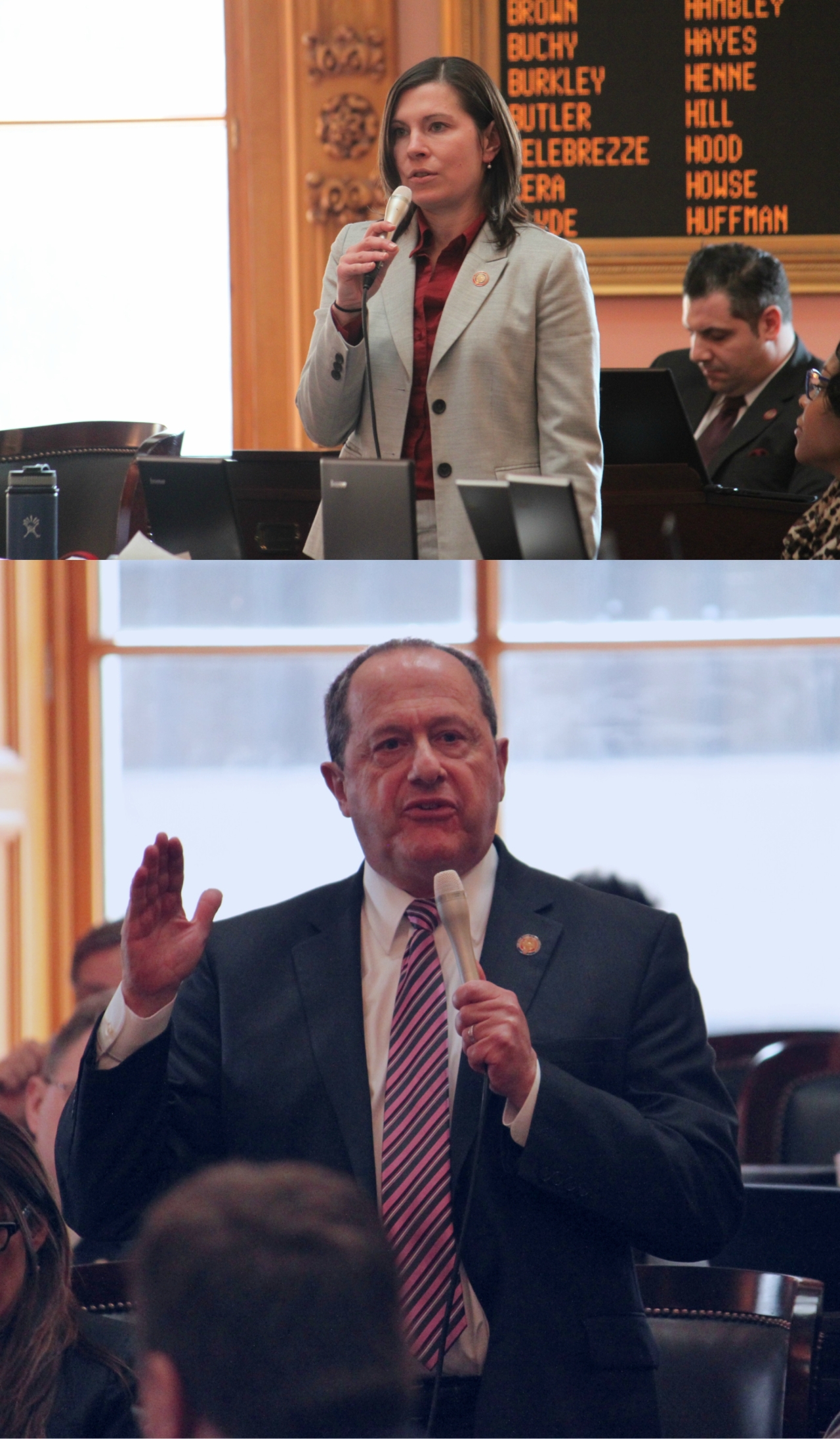Democratic News
Featured Stories
News Feed

State Reps. David Leland (D-Columbus) and Kristin Boggs (D-Columbus) testified Tuesday during Energy and Natural Resources Committee in the Statehouse on House Bill 29, their legislation to prevent the destruction of natural buffer zones growing around municipally owned drinking-water reservoirs throughout Ohio.
The Columbus lawmakers’ legislation will repeal a provision surreptitiously included in the state’s last biennial budget that allowed residents to significantly alter those zones.
“This provision, which was inserted into the previous State Budget at the last minute without public input or participation, is a potential threat to the health and safety of residents throughout Ohio,” said Leland. “Our reservoirs are a vital source of public water for Columbus and other cities, and the strips of land encircling these reservoirs act as a natural filter that removes contaminants that would threaten our water supply. Given the drinking water issues Ohio has faced in the last couple of years, we should be doing more to protect our drinking water, not less."
“It is of the utmost importance to protect our water supply and ensure that it remains clean and safe for our community to drink." Boggs said. "It is simply bad policy to give a few people the power, without any oversight, to alter landscape in a way that could have a negative impact on our water quality."
Ohio Legislative Black Caucus (OLBC) President and state Rep. Stephanie Howse (D-Cleveland) joined fellow OLBC lawmakers Tuesday for the group’s annual Day of Action. The event provided an opportunity for Ohioans to interact with state legislators and discuss issues that affect their families, communities and everyday life. The theme this year, “Still History, Still Black: Championing the Causes of African-Americans in Ohio Year-Round,” focused on struggles that disproportionately affect the black community.
“Black history is more than one month,” said Howse. “The problems and triumphs black Ohioans experience are year-round. We must nurture and encourage more engagement between black people and their elected officials to make sure all Ohioans feel connected and empowered to advocate for their own interests. We also need lawmakers to be more aware of the obstacles we all experience as Ohioans but that disproportionately affect black families. Together we can make sure black Ohioans are stronger, because when black Ohioans are strong – our state is strong.”
Ohio Legislative Black Caucus (OLBC) President and state Rep. Stephanie Howse (D-Cleveland) joined fellow OLBC lawmakers Tuesday for the group’s annual Day of Action. The event provided an opportunity for Ohioans to interact with state legislators and discuss issues that affect their families, communities and everyday life. The theme this year, “Still History, Still Black: Championing the Causes of African-Americans in Ohio Year-Round,” focused on struggles that disproportionately affect the black community.
“Black history is more than one month,” said Howse. “The problems and triumphs black Ohioans experience are year-round. We must nurture and encourage more engagement between black people and their elected officials to make sure all Ohioans feel connected and empowered to advocate for their own interests. We also need lawmakers to be more aware of the obstacles we all experience as Ohioans but that disproportionately affect black families. Together we can make sure black Ohioans are stronger, because when black Ohioans are strong – our state is strong.”

The lead Democrat on the House budget panel State Rep. Jack Cera (D-Bellaire) and Assistant Democratic Whip Emilia Sykes (D-Akron), also a budget committee member, issued the following statements in response to Ohio GOP leaders call for close to $1 billion in state budget cuts due to stagnant economic growth and opportunity in The Buckeye State after six years of unchecked Republican tax shifting and deep budget cuts:
“After six years of Ohio GOP policies that continue to shift taxes to working people and local communities to fund giveaways for the wealthiest one-percent, Ohio is now faced with a serious budget crisis, one that will force us all to pay the price for the failed economic policies of the past. We were promised that deep cuts to communities, deep cuts to schools, privatizing job creation and shifting taxes to give millionaires breaks would grow our economy and create jobs, but today’s announcement is proof Governor Kasich and other leaders have broken that promise.”
–State Rep. Jack Cera (D-Bellaire)
“Now – after having it their way without compromise for six years has brought us to the ‘verge of recession’ – schools, communities, the opioid fight, healthcare for developmentally disabled people and children, and other essential services will be defunded because politicians in Columbus don’t have the courage to do what’s needed to recession-proof our state. Instead of shoring up self-made shortfalls with Rainy Day money that was essentially stolen from schools and communities, Ohio will likely continue on it’s terrible economic trajectory with fewer resources to fend off this deteriorating economy.” –State Rep. Emilia Sykes (D-Akron)

The lead Democrat on the House budget panel State Rep. Jack Cera (D-Bellaire) and Assistant Democratic Whip Emilia Sykes (D-Akron), also a budget committee member, issued the following statements in response to Ohio GOP leaders call for close to $1 billion in state budget cuts due to stagnant economic growth and opportunity in The Buckeye State:
“After six years of Ohio GOP policies that continue to shift taxes to working people and local communities to fund giveaways for the wealthiest one-percent, Ohio is now faced with a serious budget crisis, one that will force us all to pay the price for the failed economic policies of the past. We were promised deep cuts to communities, deep cuts to schools, privatizing job creation and shifting taxes to give millionaires breaks would grow our economy and create jobs, but today’s announcement is proof Governor Kasich and other leaders have broken that promise.”
–State Rep. Jack Cera (D-Bellaire)
“Now – after having it their way without compromise for six years has brought us to the ‘verge of recession’ – schools, communities, the opioid fight, healthcare for developmentally disabled people and children, and other essential services will be defunded because politicians in Columbus don’t have the courage to do what’s needed to recession-proof our state. Instead of shoring up self-made shortfalls with Rainy Day money that was essentially stolen from schools and communities, Ohio will likely continue on it’s terrible economic trajectory with fewer resources to fend off this deteriorating economic outlook.” –State Rep. Emilia Sykes (D-Akron)
As the Ohio House of Representatives enters the next stage in state budget deliberations, House Democratic leaders today warned that GOP economic policies are blowing a hole in the Ohio budget and threatening the economic stability of working people and families.
“During the worst global economic recession since The Great Depression, Republican lawmakers called for the state budget director – at the time, a Democrat – to step down,” said House Democratic Leader Fred Strahorn (D-Dayton). “In the governor’s own words, Ohio is now on ‘the verge of a recession’. However, we are not demanding pink slips be delivered today. Instead, we believe that state leaders must take steps to recession-proof the state by investing in communities and schools, rather than approving yet another round in tax cuts for millionaires and billionaires.”
State Reps. Kathleen Clyde (D-Kent) and Stephanie Howse (D-Cleveland) today announced the introduction of the Ohio Equal Pay Act, a bill that would help close the longstanding gender pay gap between men and women in the Buckeye State.
“Too often, women with the same jobs as men and with the same education as men are paid less than men, see fewer opportunities for career advancement and are more likely to struggle to meet the basic needs of their families,” said Rep. Clyde. “The Ohio Equal Pay Act works to address the systemic undervaluing of women in the workplace and aims to ensure women are treated as what they are— equal.”

House Democratic lawmakers today called on Gov. Kasich to address the real state of the state in his annual remarks tomorrow night in Sandusky, arguing that the governor owes 11 million Ohioans an explanation on why the state is on “the verge of a recession” after six years under his leadership. The lawmakers also noted that the governor’s budget failed to adequately address the real state of the economy, education, healthcare and recent drastic state cuts to communities in Ohio.
“The last time the governor addressed the legislature he warned that Ohio was “on the verge of a recession’, but weeks later introduced a budget that doubles down on the tax-shifting policies that have harmed so many working families and brought us to this point,” said House Minority Leader Fred Strahorn (D-Dayton). “Ohioans deserve to hear honest remarks from the governor on his plan to address the economic and other challenges facing our state, because so far his plan just seems to be more of the same.”

State Rep. Michele Lepore-Hagan (D-Youngstown) was recently elected to serve as Vice Chair of the Ohio House Democratic Women’s Caucus (OHDWC), a position that plays a vital role in advancing the caucus’s agenda.
“I am honored to be elected to this leadership position by my colleagues to help advance more Ohio women,” said Lepore-Hagan. “It is so important for each and every woman to have equal opportunities and representation at home, at work and more importantly: at the state level. I look forward to working with those that share this sentiment to help build a better and brighter future for women across the state.”
House Democratic lawmakers today criticized the passage of House Bill (HB) 114, saying legislation that changes the state’s advanced energy standards to unenforceable “goals” will harm consumers and jeopardize thousands of manufacturing and development jobs in Ohio’s advanced energy industry and other industries that increasingly want and rely on advanced energy sources.
“If Ohio’s economy is on the ‘verge of a recession,’ as the governor has claimed, rolling back state renewable energy standards will threaten future job growth and could harm consumers, workers and the environment,” said House Democratic Leader Fred Strahorn (D-Dayton). “Advanced energy technologies are helping create the manufacturing jobs of the future, and we would be wise to invest now to become a leader of this emerging industry instead of falling behind the rest of the nation.”






